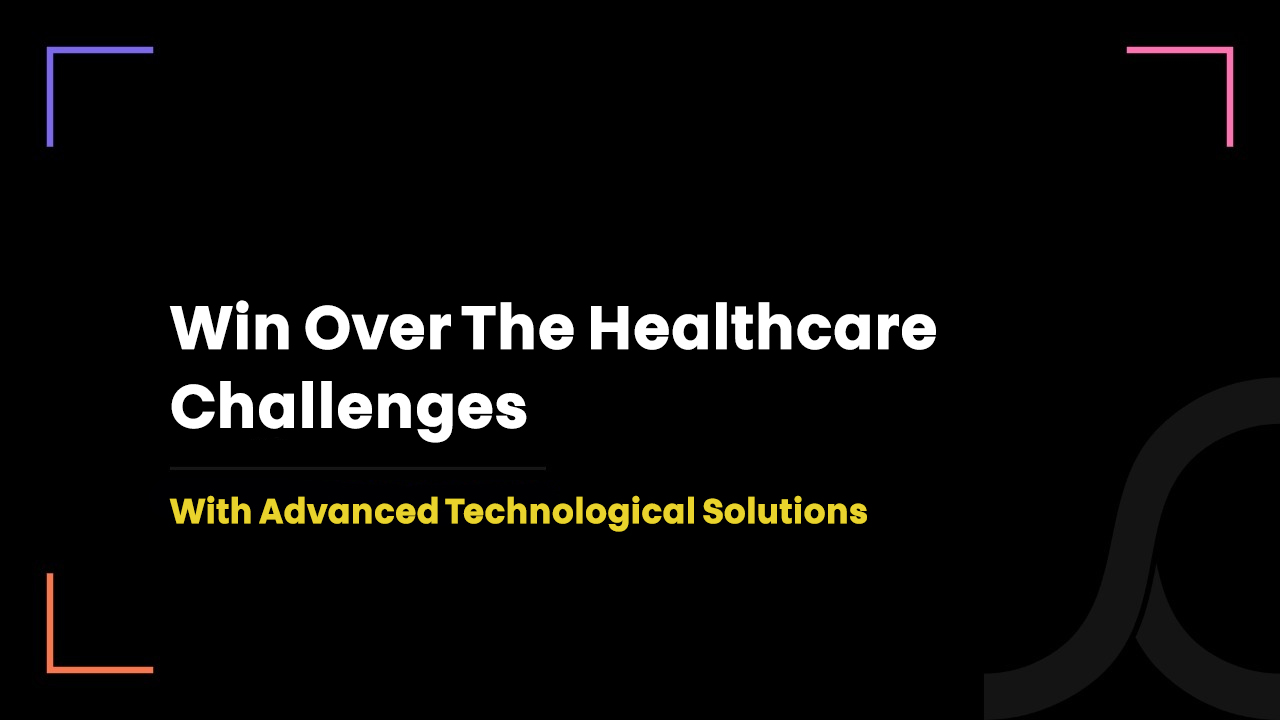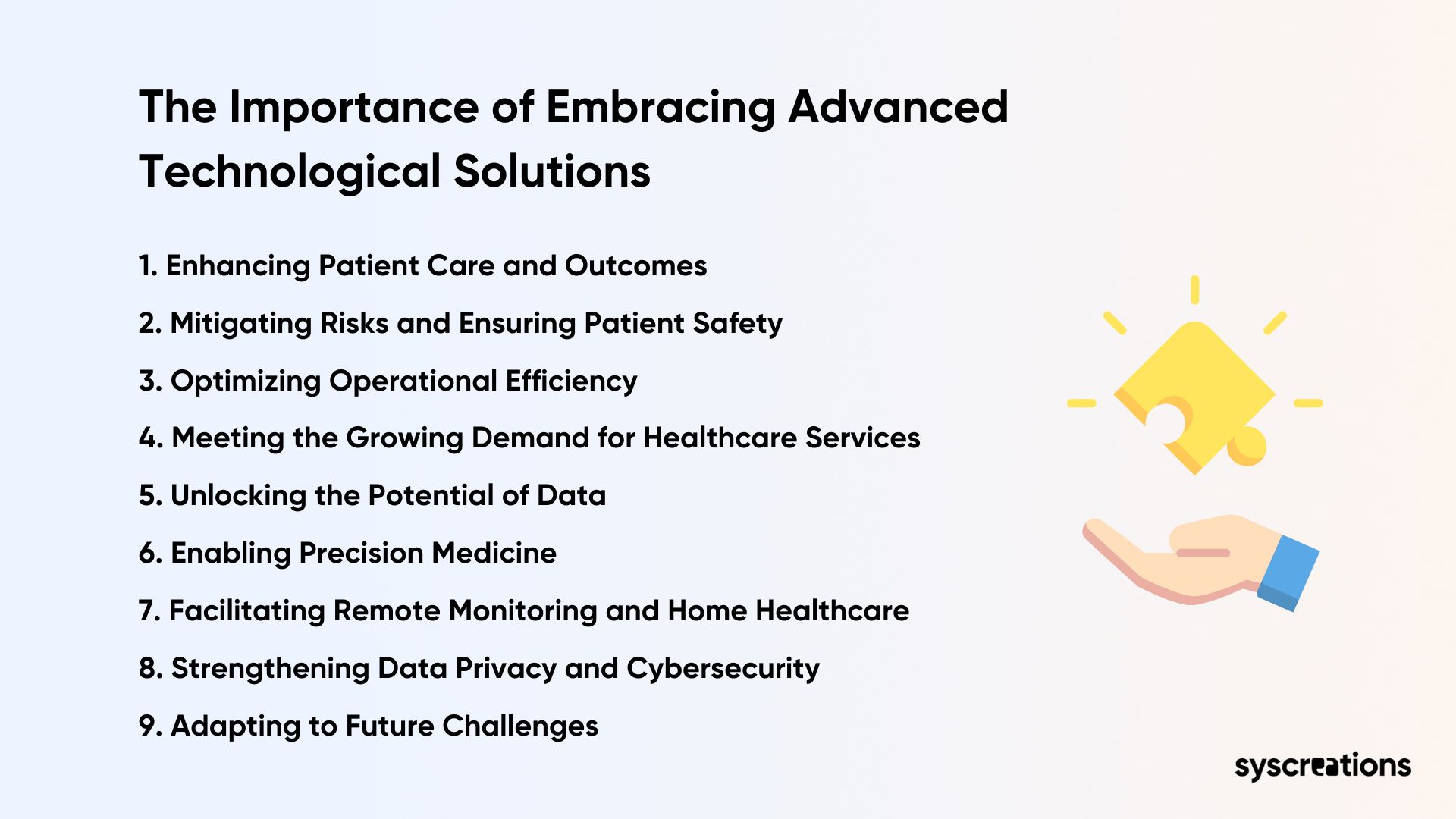Overcome The Rising Costs And Risks With Advanced Technology

8 months ago
Quality care is in high demand as the healthcare industry is experiencing escalated risks and high costs.
Hence, implementing cutting-edge technologies has become crucial.
The integration of artificial intelligence (AI) and digital platforms is one such approach.
It holds immense potential to mitigate challenges and reshape the healthcare landscape.
The Importance of Embracing Advanced Technological Solutions

1. Enhancing Patient Care and Outcomes
Advanced technological solutions are revolutionizing patient care by providing
- Accurate diagnoses
- Personalized treatment plans
- Continuous monitoring
AI-powered algorithms can analyze vast amounts of patient data, identify patterns, and assist healthcare professionals in making informed decisions.
By harnessing digital platforms, medical practitioners gain access to real-time patient information, enabling them to provide proactive and precise care.
This technology empowers physicians to tailor treatments based on individual patient characteristics, leading to more effective interventions and improved outcomes.
Additionally, digital platforms offer real-time access to patient information, allowing for proactive and precise care delivery.
This technology ensures timely interventions, reduces errors, and ultimately leads to improved patient outcomes.
2. Mitigating Risks and Ensuring Patient Safety
Healthcare is a high-stakes industry, and any error can have grave consequences.
Advanced technological solutions have emerged as powerful tools to mitigate risks and ensure patient safety.
AI-powered predictive analytics, for instance, enable proactive risk management by identifying potential hazards before they escalate.
Machine learning algorithms can detect anomalies in patient data, flagging potential complications and adverse events.
By leveraging digital platforms, healthcare organizations can
- Streamline processes
- Improve coordination
- Enhance patient safety measures
Automation and data-driven insights reduce the likelihood of errors, resulting in better risk mitigation and ultimately saving lives.
3. Optimizing Operational Efficiency
The healthcare industry faces significant challenges regarding cost management and resource utilization.
Advanced technological solutions offer avenues to optimize operational efficiency and reduce financial burdens.
AI-powered algorithms can
- Analyze large datasets
- Identify inefficiencies
- Suggest process improvements
Digital platforms facilitate seamless collaboration and information exchange between different healthcare stakeholders, streamlining workflows and eliminating unnecessary administrative tasks.
By embracing these technologies, healthcare providers can reduce costs, improve resource allocation, and enhance overall operational effectiveness.
4. Meeting the Growing Demand for Healthcare Services
The demand for healthcare services is rapidly increasing, driven by factors such as
- Aging populations
- Rising chronic illnesses
- Global health crises
Advanced technological solutions help address this mounting demand by expanding access to care and optimizing resource allocation.
Telemedicine, enabled by digital platforms, allows healthcare professionals to remotely diagnose and treat patients, bridging geographical barriers.
This technology not only improves access to care for underserved populations but also reduces the burden on physical healthcare facilities.
AI-powered chatbots and virtual assistants offer round-the-clock support, answering patient queries and triaging cases.
By embracing these technologies, healthcare organizations can deliver timely care, reduce waiting times, and alleviate the strain on healthcare systems.
5. Unlocking the Potential of Data
Data is a goldmine in the healthcare industry.
But it is often underutilized.
Advanced technological solutions enable the efficient processing and analysis of vast amounts of healthcare data, leading to valuable insights and discoveries.
AI algorithms can
- Identify disease trends
- Predict outbreaks
- Support research endeavors
Digital platforms facilitate data interoperability, allowing different healthcare systems to seamlessly exchange information and collaborate.
By harnessing the power of data through advanced technologies, the healthcare industry can unlock breakthroughs in
- Research
- Personalized medicine
- Population health management
This data-driven approach enables evidence-based decision-making, accelerates medical research, and enhances patient care delivery.
6. Enabling Precision Medicine
Advanced technological solutions, particularly AI and big data analytics, have opened new avenues for precision medicine.
AI algorithms can identify genetic markers, predict disease progression, and tailor personalized treatment plans by analyzing a vast amount of
- Genomic data
- Patient records
- Treatment outcomes
This approach allows healthcare providers to move away from a one-size-fits-all model and deliver targeted interventions based on an individual's unique characteristics.
Implementing advanced technologies enables the integration of
- Genomics
- Proteomics
- Other omics data
It revolutionized the approach to disease prevention, diagnosis, and treatment.
7. Facilitating Remote Monitoring and Home Healthcare
Advanced technological solutions play a crucial role in facilitating remote monitoring and enabling home healthcare.
IoT devices, wearable sensors, and mobile applications can collect real-time patient data, such as
- Vital signs
- Activity levels
- Medication adherence
This data can be securely transmitted to healthcare providers.
AI algorithms can analyze this data to
- Detect anomalies
- Provide early warnings
- Trigger appropriate interventions
These technologies empower patients to actively participate in their care while reducing the burden on healthcare facilities, particularly for patients with chronic conditions or those who live in remote areas.
8. Strengthening Data Privacy and Cybersecurity
With the integration of advanced technologies in healthcare, it is crucial to address concerns regarding cybersecurity and data privacy.
As sensitive patient data becomes increasingly digitized and interconnected, the risk of data breaches and unauthorized access increases.
Implementing robust cybersecurity measures is essential to safeguard patient information.
- Encryption
- Secure data storage
- Multi-factor authentication
Additionally, adhering to strict data privacy regulations, such as HIPAA in the United States, ensures that patient rights and confidentiality are protected.
Healthcare organizations can build trust and confidence among patients and stakeholders by prioritizing cybersecurity and data privacy.
9. Adapting to Future Challenges
The healthcare industry is dynamic, and it constantly faces new challenges and disruptions.
Advanced technological solutions provide the agility and adaptability necessary to navigate these challenges effectively.
Healthcare organizations can future-proof their operations and stay ahead of the curve by embracing technologies such as
- Machine learning
- Natural language processing
- Robotic process automation
These technologies enable
- Predictive modeling
- Scenario planning
- Agile decision-making
It allows healthcare providers to respond to emerging trends and address future healthcare needs proactively.
Embrace The Merits of the Advanced Technological Solutions
Implementing these advanced technological solutions can be a bit complicated.
Finding a reliable development partner will make the work easy for you.
We are a healthcare-dedicated software development company, working in the domain for almost a decade.
As we only accept healthcare projects, it becomes easy for us to navigate through the compliances and regulations of the industry.
Over the years, we have grown our knowledge base and have become one of the masters in the field.
Leverage the benefit of our extensive knowledge and upgrade your existing systems.
Connect with us today and embark on a journey towards advanced technological solutions.
